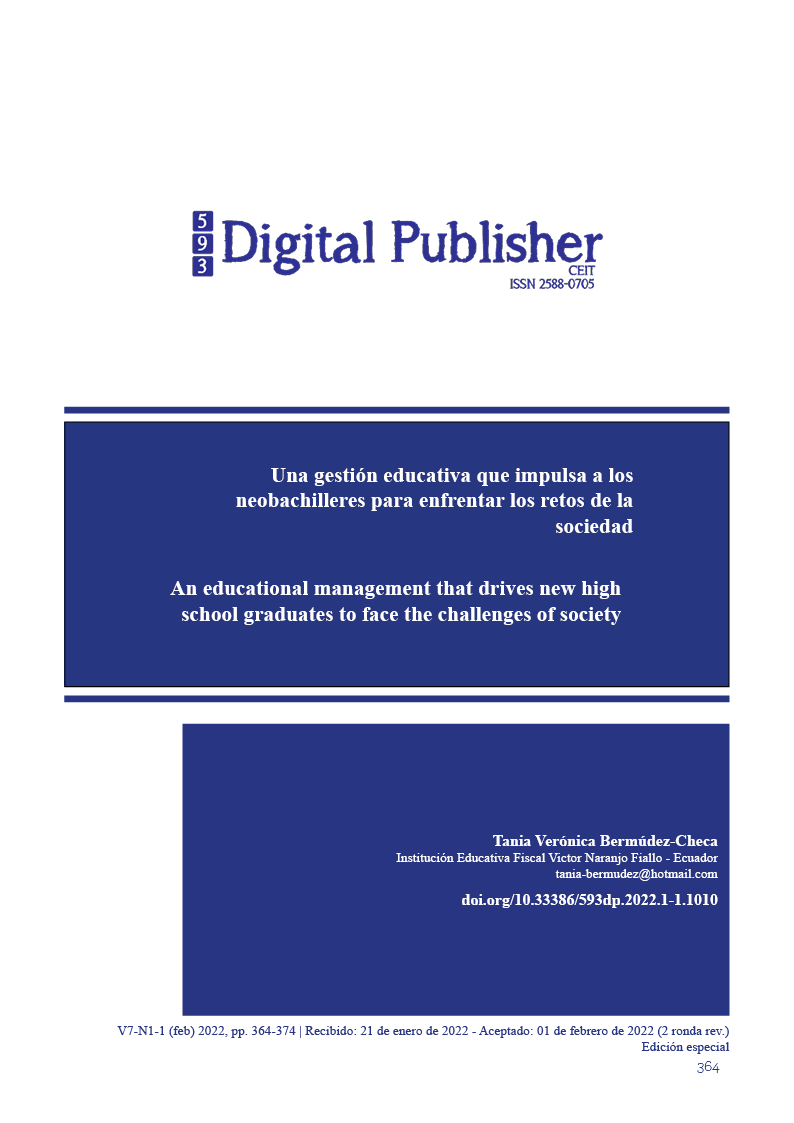An educational management that drives new high school graduates to face the challenges of society
Main Article Content
Abstract
The objective of this study is to analyze the dynamics of educational management that encourages neo-high schoolers to face with justice, solidarity and innovation the challenges of society. The methodology used was theoretical and documentary review, the academic search engines that support and strengthen the study respond to ScienceDirect, Ovid Embase, EBSCO, PROQUEST Sociological, Redalyc.org, SCIELO, ELSEVIER established in a matrix of 61 theoretical and research articles whose contributions were gradually removing the bias product of the initial perception and leading toward the scientific and sustained look of the problem, being the main problem affecting youth in Ecuador is that more than 40% of graduates do not achieve a job insertion due to lack of practical experience, which has an influence on the development of skills in the bachelor's jobs. and through the impulse of educational management its transformative process of the system has helped school institutions by setting goals that allow for quality improvement. In conclusion, the effective actions of educational management confirm that they encourage bachillers to face the challenges of today's society by implementing tools in an integrated way to ensure that the skills delivered throughout their training process enable them to effectively master knowledge allowing them to gain safety, fluency in speech and behavior that helps them get a job based on the trainings received in a responsible and timely manner.
Downloads
Article Details

This work is licensed under a Creative Commons Attribution-NonCommercial-ShareAlike 4.0 International License.
1. Derechos de autor
Las obras que se publican en 593 Digital Publisher CEIT están sujetas a los siguientes términos:
1.1. 593 Digital Publisher CEIT, conserva los derechos patrimoniales (copyright) de las obras publicadas, favorece y permite la reutilización de las mismas bajo la licencia Licencia Creative Commons 4.0 de Reconocimiento-NoComercial-CompartirIgual 4.0, por lo cual se pueden copiar, usar, difundir, transmitir y exponer públicamente, siempre que:
1.1.a. Se cite la autoría y fuente original de su publicación (revista, editorial, URL).
1.1.b. No se usen para fines comerciales u onerosos.
1.1.c. Se mencione la existencia y especificaciones de esta licencia de uso.
References
Benasso, N. (2018). ¿Trabajar o Estudiar? Estudio cualitativo sobre las trayectorias post - secundarias de jóvenes del área metroponitana de Buenos Aires. Buenos Aires, Argentina: Facultad Latinoamericana de Ciencias Sociales (FLACSO). Obtenido de https://repositorio.flacsoandes.edu.ec/handle/10469/14084
Bravo, L., Amayuela, G., & Colunga, S. (2017). Tendencias históricas del proceso de educación emocional en los estudiantes del bachillerato en Ecuador. Mendive. Revista de Educación, 15(3), 1 - 10. Obtenido de http://scielo.sld.cu/scielo.php?script=sci_arttext&pid=S1815-76962017000300005&lng=es&nrm=iso
Cantos, M., & Reyes, J. (Diciembre de 2018). El nuevo modelo de gestión educativa y su impacto en las escuelas de educación básica del cantón Cañar, Ecuador. (U. C. Cuenca, Ed.) Kilkana Sociales, 2(4), 1-8. Obtenido de https://dialnet.unirioja.es/servlet/articulo?codigo=6799305
Castillo, N., & Montes, G. (2018). La experiencia vivida de ser estudiante de bachillerato de nuevo ingreso. Revista Sinética, 51, 5. Obtenido de http://www.scielo.org.mx/pdf/sine/n51/2007-7033-sine-51-00002.pdf
CEPAL. (2020). La educación en tiempos de la pandemia de COVID - 19. Quito: CEPAL - UNESCO. doi:https://repositorio.cepal.org/bitstream/handle/11362/45904/1/S2000510_es.pdf
Doncel, D., Sonsoles, R., & Merchante, C. (2019). Orientación Académica y Profesional: percepción del mercado de trabajo desde las Consejerías de Educación españolas. Educ. Pesqui, 45, 2 - 23. Obtenido de https://www.scielo.br/j/ep/a/hrMtYCVV3Sp5PhrTKHCnzHk/?lang=es&format=pdf
Gil, D. (2019). La Labor del Psicólogo Educativo, en el Proceso de Elección de Carreras de los y las Estudiantes del 3ro de Bachillerato de la Unidad Educativa “Juan Montalvo”. Quito. Obtenido de http://www.dspace.uce.edu.ec/bitstream/25000/17271/1/T-UCE-0010-FIL-220.pdf
Ministerio de Educación. (2020). Plan educativo. Sección 5: Socioemocional (Primera edición ed.). Quito: MinEdu. doi:https://educacion.gob.ec/wp-content/uploads/downloads/2020/09/Seccion-5_Socioemocional.pdf
Organización Internacional del Trabajo. (2020). Desempleo, informalidad e inactividad asedian a los jóvenes en América Latina y el Caribe. Naciones Unidad, América Latina. doi:https://www.ilo.org/global/publications/world-of-work-magazine/articles/WCMS_081423/lang--es/index.htm#:~:text=La%20mitad%20de%20los%20desempleados,j%C3%B3venes%20en%20la%20%C3%BAltima%20d%C3%A9cada.&text=Unos%2088%20millones%20de%20j%C3%B3venes,carecen%2
Pérez, O. (2018). La gestión educativa. conceptos fundamentales. Bogotá, Colombia: Confederación Interamericana de Educación Católica. Obtenido de https://wcpro.s3.amazonaws.com/PROYECTO_EDUCATIVO_FRANCISCO.pdf
Rabanal, R., Huamán, C., Murga, N., & Chauca, P. (2020). Desarrollo de competencias personales y sociales para la inserción laboral de egresados universitarios. Revista de Ciencias Sociales (RCS), XXVI(2), 250 - 258. Obtenido de https://www.redalyc.org/journal/280/28063431020/html/
Rico, A. (2016). La gestión educativa: hacia la optimización de la formación docente en la educación superior en Colombia. Sophia, 12(1), 55 - 70. Obtenido de http://www.scielo.org.co/pdf/sph/v12n1/v12n1a04.pdf
Romero, G. (2018). Educational quality: gear between knowledge management, educational management, innovation and learning environments. Journal of Studies and Experiences in Education, 17(35), 91 - 103. Obtenido de Dialnet-CalidadEducativa-6698547.pdf
Sánchez, T. (2018). Articulación del Bachillerato General Unificado (BGU) con la Educación Superior para el acceso al campo laboral. Revista Dilemas Contemporáneos: Educación, Política y Valores., VI(1), 1 - 15. Obtenido de https://web.a.ebscohost.com/abstract?direct=true&profile=ehost&scope=site&authtype=crawler&jrnl=20077890&AN=130757924&h=
Secretaria Nacional de Planificación y Desarrollo. (2017). Plan Nacional del Buen Vivir 2017 - 2021. Planificamos para toda una vida. Quito: SEMPLADES. doi:https://www.gobiernoelectronico.gob.ec/wp-content/uploads/downloads/2017/09/Plan-Nacional-para-el-Buen-Vivir-2017-2021.pdf
Sevilla, M. (2017). Panorama de la educación técnica profesional en América Latina y el Caribe. Santiago: Comisión Económica para América Latina y el Caribe (CEPAL). Obtenido de https://www.cepal.org/es/publicaciones/40920-panorama-la-educacion-tecnica-profesional-america-latina-caribe
SITEAL. (2018). Nuevo Bachillerato Ecuatoriano. Quito: Sistema de Información de Tendencias educativas en América Latina. Obtenido de https://siteal.iiep.unesco.org/sites/default/files/sit_accion_files/ec_0234.pdf
Solís, M., & Duarte, P. (2018). La educación superior tecnológica y la empleabilidad. Revista Universidad y Sociedad, 10(3), 12. Obtenido de http://scielo.sld.cu/scielo.php?script=sci_arttext&pid=S2218-36202018000300021
Tomaselli, A. (2018). La educación técnica en el Ecuador. El perfil de sus usuarios y sus efectos en la inclusión laboral y productiva. Santiago: a Comisión Económica para América Latina y El caribe (CEPAL). Obtenido de https://www.cepal.org/es/publicaciones/43219-la-educacion-tecnica-ecuador-perfil-sus-usuarios-sus-efectos-la-inclusion
Tricco, A., Erin, L., Zarin, W., O´Brien, K., Colquhoun, H., Levac, D., . . . Weeks, L. (2018). PRISMA Extension for Scoping Reviews (PRISMA- ScR): Checklist and Explanation. Annals of Internal Medicine. Research and Reporting Methods., 169(7), 467 - 473. doi:doi:10.7326/M18-0850


